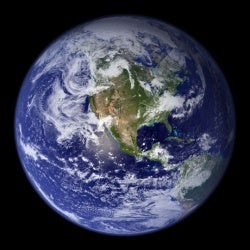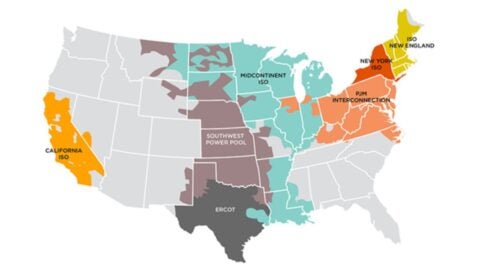Save Our Satellites: We Need Their Climate Data
 This post is by Lisa Moore, Ph.D., a scientist in the Climate and Air program at Environmental Defense Fund.
This post is by Lisa Moore, Ph.D., a scientist in the Climate and Air program at Environmental Defense Fund.
 Have you ever spent time scrolling through NASA’s image gallery? Some of the pictures are mesmerizing. I particularly like the "Blue Marble" image of the Earth (at right), which was stitched together using satellite data.
Have you ever spent time scrolling through NASA’s image gallery? Some of the pictures are mesmerizing. I particularly like the "Blue Marble" image of the Earth (at right), which was stitched together using satellite data.
Satellites provide more than pretty pictures. Our ability to understand and predict climate change depends on continuous high-quality satellite data.
Unfortunately, this critical data stream is threatened by budget cuts and lack of political support. In 2005, the National Academies assessed the situation and deemed it "alarming". Three years later, the outlook has not improved.
What Satellites Can Tell Us
Here are just a few examples of the indispensible role satellites play in weather and climate science. Satellites have provided a way to:
- Confirm that global warming is not caused by changes in the Earth’s reflectivity or "albedo".
- Monitor and verify changes in deforestation emissions (key to any plan to reduce deforestation in developing countries).
- Track ice sheet melting and sea level rise.
- Predict and track storms and floods.
- Improve accuracy of climate models in simulating atmospheric temperature trends, the effects of aerosol pollution, and more.
But crucial information like this may not be available in the future. Many planned satellite missions have been delayed, pared down, or cancelled due to budget cuts. For example, sensors that would have measured important climate-related variables such as solar irradiance, aerosols, and sea level have been removed from the upcoming National Polar-orbiting Operational Environmental Satellite System.
Existing satellites don’t last forever, so these cutbacks put long-term records at risk, precisely when we need all the information we can get about climate change and its effects.
We Need Funding for Satellites
The National Academies Press has published several reports (here, here, and here) proposing short-term solutions that would avoid gaps in crucial datasets. But what we really need is a long-term commitment to a unified, high-quality Earth observation program.
This issue is so pressing that it was highlighted in a recent editorial in the journal Nature, which called on the next U.S. president to make Earth observation a priority. As Nature put it, "Providing for continuous high-quality climate data would be a substantial legacy, serving the interests of both U.S. citizens and the rest of the world for decades to come."













4 Comments
So what can we do about this Lisa? Of course I agree with your premise, but are there any actions I can take that will help reverse this trend?
Peter,
EDF’s science adviser Michael Oppenheimer put it this way: “Congress thinks average people don’t care about this stuff”. So let them know you think it’s important. After all, if they want to fight global warming, this has to be part of the plan.
Thanks for asking!
Hi Lisa,
” To SEA or not to SEE: Flying Blind into climate Change” …sounds dangerous
We need to have vision, in many forms, to navigate toward climate balance.
It should not be complicated for people to understand that seeing the earth from space is very important for climate, food and water.
It may be a good test for “BAU2” Business As UnUsusal – what does it look like?
I think many people would want to help keep satellites in place so we can see patterns and changes.
This is a “theatrical thought”- Perhaps could have “bake sales for climate satellites” science clubs, churches, star gazer groups – etc fund raise. (every body needs this tool for our wellness) people from EU and Australia might help. It would be a bit of a “practical -joke” but the real joke is in not letting climate scientists see what is changing and how fast.
It would bring people together, with something doable- and fun, raise money and awareness. It would show that people care and want this addressed. School “climate plays’ could help address general questions and help move from denial and confusion into action and resourcefulness.
BAU2 You too …. “in the theater of climate – balance and humor”
It would bring the issue to light
Cheers!
As a meteorologist I second Lisa’s comments: There are real concerns about the future of weather and earth science satellites.
Mike